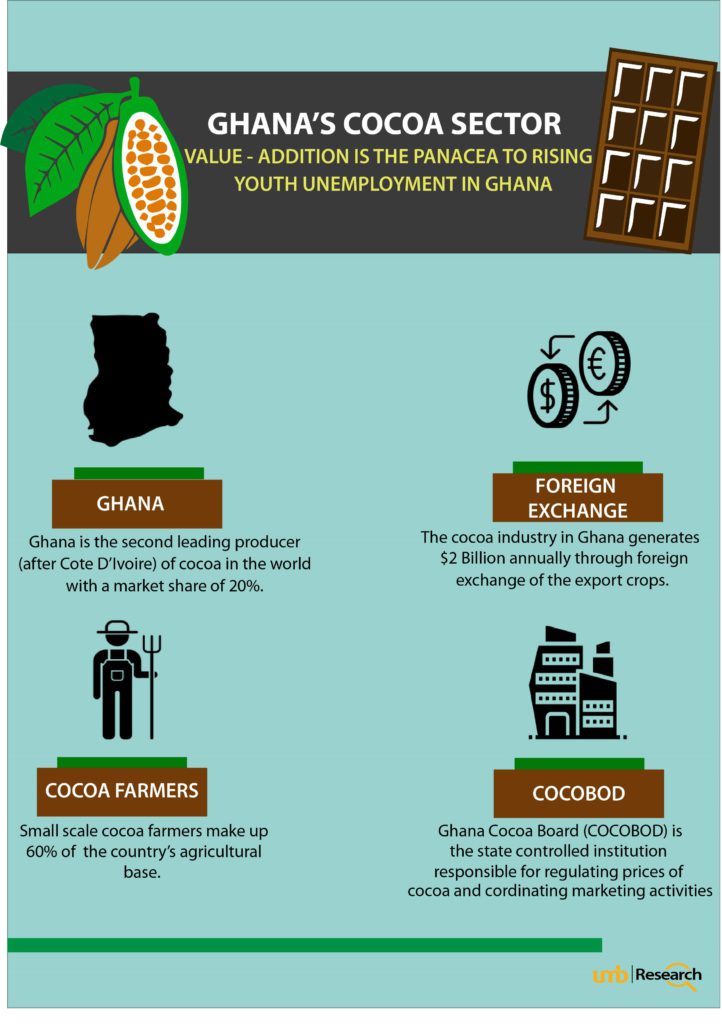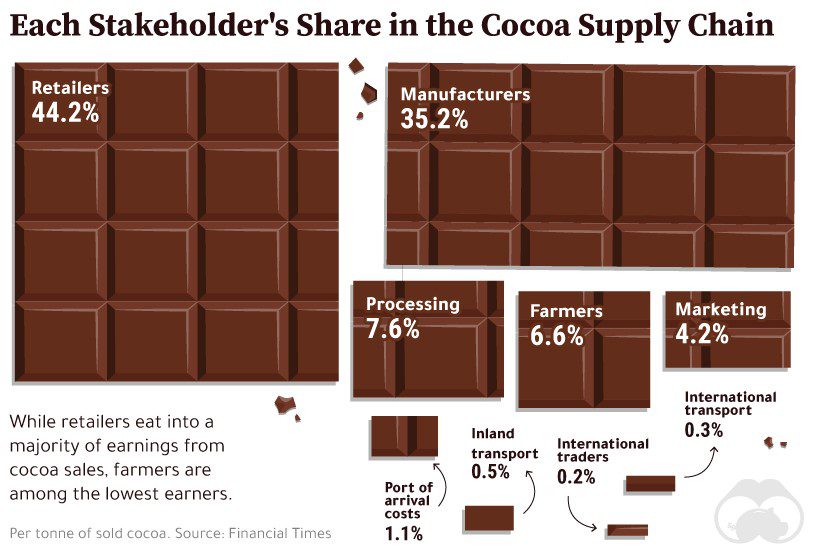A key item of discussion here in Ghana is on the question of youth unemployment. Ghana, like many sub -Saharan African countries is afflicted / or blessed with what is described as the youth bulge.
This means the majority of our growing populations are children and young adults.
Ordinarily, this bulge should bear a great dividend, as this segment is innately productive. However, many African countries seem unable to leverage this and are now afflicted with the woes of unemployment. This has charged discourse in Ghana over the last few years and this paper argues that the Cocoa Value Chain represents a viable answer to this.
Each step of the value chain creates jobs but our focus argues that Domestic Processing will move sustainable jobs from Europe to Africa. Furthermore, we argue that opportunities from the Africa Continental Free Trade Area (AFCFTA) definitely will deliver a larger single market with countless opportunities for the cocoa value chain, once harnessed. At this point, cocoa accounts for approximately 60% of the agricultural workforce at average daily wage of $1. If we scaled up the value addition, the economy would retain 20% more of the revenue leading to approximate 5.2% more entrants into the workforce*. (Based on extrapolation from www.odi.org )
For instance, at the recent cocoa awards, our bank representation chanced on a remarkedly simple but astounding innovation in cocoa. KOA Impact, an interesting industry has begun the successful production of fruit juice using an oft wasted part of cocoa- the pulp. Their delicious nectar has all the potential of sparking a similar value chain to the grape industry in Australia or California- since the scale for mass production already exists. Imagine the revenue wallet, if this juice was marketing to become the staple juice in the 300 million population in ECOWAS.

UMB as a Bank is clear about the potential for value -addition in Cocoa. Our Bank has focused on this industry since 1972 (the year UMB was established) and currently Banks 35% of all Local Buying Companies (LBCs). In the coming years, under the ambit of government policy, we aim to become the bank of choice to other players in this value chain. We recently, for example, led the way to structure a multi-million-dollar facility for an indigenous company, a key fertilizer player in this industry which lends credence to our continuous support to this sector.
In summary, we assert the argument. Theobroma (food for the gods) Cacao presents a fine opportunity to change the narrative on the ever-increasing youth unemployment with a focus on specific policy interventions. In that regard the COCOBOD aspiration of $50billion from cocoa by 2030 is the kind of exciting policy direction, in this regard. These policy interventions must focus on value-add at all levels of the value chain. This is perhaps best achieved through an execution plan following through on the next steps and setting key milestones on the COCOBOD 2030 @ $50billion aspiration.

On this note, on behalf of the leadership and colleagues at Universal Merchant Bank, we salute our gallant farmers and fishermen, especially in the COCOA SECTOR. Ayekoo on FARMERS DAY 2021 and may we amplify the heritage of Tetteh Quarshie with 1 million jobs and $50billion in revenue, by 2030.
This article was co-authored by:
Philemon Okyere Danquah
Philemon serves as General Manager -Corporate Banking at the Universal Merchant Bank (UMB). Philemon has over 2 decades of banking experience. His career has seen progressive growth in Wholesale Banking with significant stints at key finance houses. He currently leads the Corporate Banking unit at UMB. UMB is a leading Ghanaian bank with a particularly storied pedigree in Wholesale Banking. The Bank was established in 1972 and has significant domain strengths in agribusiness.
Stephen Ampadu
Stephen serves as the Head of Research and Business intelligence at the Universal Merchant Bank (UMB). Stephen is a thought-leader with significant expertise in economic and consumer research. He belongs to the emerging school in statistics that is committed to structuring statistical and economic analysis suited to the African experience and perspective. He currently leads UMB’s effort to provide data and analytics of the Ghanaian economy and other markets in ECOWAS for SME’s. Stephen drives UMB’s heritage of providing a uniquely Ghanaian perspective to market data, since 1972.
Latest Stories
-
Lady sues Police and AG over assault in custody
25 mins -
Ghana’s railway sector has been revived under my leadership – Akufo-Addo
45 mins -
Next government must enforce C190 – Women Economic Dialogue Forum
50 mins -
NCCE engages party youth activists at Nandom on peaceful election
51 mins -
SSNIT engages stakeholders on its operations
53 mins -
Defilement: 19-year-old farmer jailed ten years, with hard labour
55 mins -
Bawumia to inaugurate new headquarters of Lands Commission on November 25
57 mins -
Sylvester Tetteh denies demolishing GBC staff bungalow
1 hour -
Signing of peace pact by presidential candidates slated for November 28
1 hour -
Akufo-Addo reiterates commitment to free and fair elections
1 hour -
Climate change impact poses threat to Ghana’s financial stability – BoG Governor
1 hour -
Ursula Owusu-Ekuful assures of leading NPP to victory in Ablekuma West
1 hour -
Akufo-Addo urges armed forces to maintain neutrality, professionalism
1 hour -
Driver jailed 15 years for robbery
1 hour -
Election 2024: Bawumia is a timely asset for NPP and Ghana – Freddie Blay
2 hours

